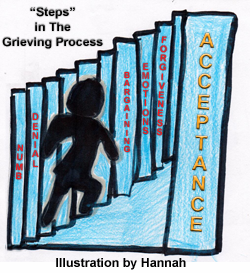 Before taking a break for Thanksgiving, my posts had been listing all the many different types of losses we might incur on The Highway of Life. I concluded that series with the ways How All Losses Are Related.
Before taking a break for Thanksgiving, my posts had been listing all the many different types of losses we might incur on The Highway of Life. I concluded that series with the ways How All Losses Are Related.
All Losses Must Be Grieved, is crucial to our healing and perhaps the main way all losses are related. Herein lies our Number #1 problem — “Not Knowing How to Grieve.” As a result, loss after loss begins to be packed into our life. Ultimately, we get to the point that we are carrying around so much excess baggage that the load becomes too difficult to manage.
As the saying goes: “I’ve been there, done that.” I don’t ever want to go back to that place of feeling hopeless and overwhelmed by the circumstances of life. I will say, however, that out of losses in my life and the healing God has brought about, it has given me a passion to pass onto others things I have learned through the study of grief. Out of my studies and experience, I wrote a study guide for adults and taught it for over 10 years at my local church, as well as publishing my book, Helping Hurting Children: A Journey of Healing. (See sidebar)
Today, I want to briefly introduce you to the steps most often associated with the process of grieving through a loss. As time goes on, I will be covering each step in detail.
Step 1. Numb: The state of shock immediately following a loss. You might say it works like a tranquilizer that helps you get through the initial onslaught.
Step 2. Denial: Once the numbness wears off, the pain sets in. In an effort to avoid pain,
we often use defense mechanism to block pain.
Step 3. Bargaining: Simply put, we often try to cut a deal with God to get us out of a
situation quickly, rather than walking through the pain associated with
the loss and feeling His comfort.
Step 4. Emotions: Reactions to life’s circumstances.
Step 5. Forgiveness: The act of releasing others and yourself from hurts in your life.
Step 6. Acceptance: Acceptance does not mean approval; it means accepting life at a new
place and begin the process of moving forward.
Step 7. ?? There’s one additional step in The Grieving Process. This step can’t be taught, but it is vital to our healing. Webster defines this step as salty fluid that flows from the eyes. There will be times when words can’t express the ache of your heart. It is then that these tiny salty balls of fluid will flow from the deepest part of your soul, bringing with them all your painful emotions and yes, even joy that is indescribable.
I’m sure you have guessed what this step is by now. Yes, it is tears—they have a job to do! Let
them flow!
May I quickly point out that there is no systematic order in which an individual goes through these seven steps. But, at some point in time, all of these steps will need to be covered before a person can go on with life in a healthy way after a loss.
You may “bounce” in an out of a step several times before coming to grips with that particular phase of the process. Do not be discouraged when that happens; remember that healing is a process, and time is your ally. However, contrary to the old saying that time heals all wounds, Dr. Phil McGraw says it this way: “Time does not heal, it’s what we do with time that heals.”
Think of the time and attention that a farmer gives to seeds that he plants in his field. His care and attention is what causes the seeds to grow and come to harvest. If left alone, they would not produce.
 CHALLENGE: Matthew 4:16 — “The people which sat in darkness saw great light and to them which sat in the region and shadow of death, light is sprung up.”
CHALLENGE: Matthew 4:16 — “The people which sat in darkness saw great light and to them which sat in the region and shadow of death, light is sprung up.”
This scripture is in reference to the one that Isaiah foretold that Jesus would come one day and dwell in Capernaum and he said there would be Gentiles who would be sitting in darkness and that they would see great light. That light was Jesus. (Isaiah 9:1) We know today that that is exactly what happened. Jesus was in Capernaum during his earthly ministry and those who were sitting in darkness saw this great light.
Jesus is the same yesterday, today, and forever. He wants to bring light into those dark situations in your life.
DO NOT SIT IN DARKNESS ANY LONGER!
BEGIN YOUR JOURNEY INTO THE LIGHT!
I will be teaching on each of these steps starting in January. Hannah and I are looking forward to traveling this journey with you.
Meanwhile, with the holidays coming up, no doubt many of you are already wondering, “how will I ever survive them, especially if you have experienced a loss this year.”
So, I invite you to join Hannah and me next week as we suggest ways for Surviving the Holidays After a Death.










 Mourn is the same word as grieve, which means to feel or express sorrow.
Mourn is the same word as grieve, which means to feel or express sorrow.

